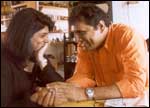
|
'How am I gonna pull this thing off?'
Ram Madhvani battled insecurity to make Let's Talk
|
Kanchana Suggu
Ram Madhvani, debutante director of Let's Talk, starring newcomer Maia Katrak and stage actor Boman Irani, says he is suffering from PMS.
"Pre-movie release syndrome," he explains.
His film will open for audiences at three theatres in Mumbai, one in Delhi and one in Pune on Friday, December 13. But Madhvani believes he has already been paid back, emotionally.
Consider: his 95-minute film premiered at the 55th Locarno International Film Festival; it made the 25th Mill Valley Film Festival in California; it is now part of the films selected for the University of Chicago's course on Indian cinema; it won high praise from Ismail Merchant, Shabana Azmi, Shyam Benegal, Aamir Khan, Vidhu Vinod Chopra and Pooja Bhatt at the recent Mumbai International Film Festival. Madhvani says it almost feels as if he has been vindicated.
The germ for Let's Talk originated about four years ago. Based on the traditional Indian music form thumri where a single thought is expressed in multiple moods, grew the idea to make a film about a woman who gets pregnant out of wedlock. She then imagines her husband's various reactions to her predicament.
"When I first narrated this idea, everybody thought it was one of the worst ideas ever," laughs Madhvani.
But he went ahead anyway. Now, that "foolish courage" to direct a feature film that he has been mustering since he was 16 has already seen a fair amount of success.
When it comes to acceptance from the public, Madhvani prefers to be "realistic."
"If the film runs for a week, I'll be happy," he says. "If it runs for two, I'll be thrilled."
While he says the commercial success of Let's Talk doesn't really matter, he also knows it is important. First, it will provide financial fodder for his forthcoming films. Second, it will pave the way for an international release. "An international release depends on how well the film does here and whether more than two people come and see it," he laughs.
Madhvani says his team made Let's Talk for themselves. His film has no formula, he asserts. "You just go out there and make a film that you hope will make people cry; you hope will make people laugh; and you hope will make them think."
He admits that seeing a life-sized poster of Let's Talk at northwest Mumbai's Fame Adlabs multiplex was thrilling; undoubtedly, one of the proudest moments of his life.
The making of Let's Talk has been an emotional experience for him as much as it has been for actors Irani and Katrak, writer Sanjay Sipahimilani and debutante cinematographer Sumantra Ghosal; what with juggling a demanding profession and an intense feature on infidelity, relationships and love.
 Madhvani offers a glimpse into the trials of shooting, his cast, and the making of Let's Talk:
Madhvani offers a glimpse into the trials of shooting, his cast, and the making of Let's Talk:
Boman fainted on the fifth day, Maia on the seventh
After the concept originated four years ago, I went in search of scriptwriters. I went to Maia Katrak and Sanjay Sipahimilani, both from the advertising world, because I thought we had a mind share. We spent a year writing the script because all of us were busy with advertising.
My partner Sumantra Ghoshal, who also produced Let's Talk, suggested we make a scratch film. So we spent seven days shooting a one-hour film. It was emotionally traumatic. Boman fainted on the fifth day and practically had a heart attack. Maia fainted on the seventh day. All this, I think, was because of the whole process of getting into the role.
I wanted to undo many things I find formal and deliberate in most Indian English cinema. I had to keep prodding and pushing. By the end, even Sumantra fell ill.
The only guy who survived was me.
I was greedy for Boman
We had done an ad film together and I had seen him in [the plays] Mahatma vs Gandhi, I'm Not Bajirao and Jesus Christ Superstar (all stage productions). I felt here is a guy I was sort of greedy for because I think he is genuinely one of our finest unrecognised talents so far.
Boman did not want to do it and said he was very busy. I shouted at him, "Shut up, you are doing it." He agreed. Post this film, I think he will get a huge amount of recognition.
Maia knew the role the best
Maia had done a course in acting 12 years ago. I had tested over 50 actresses, but finally decided on Maia because she knew the role the best and had less to unlearn.
A lot of my preparation was to make sure she was comfortable enough to believe in what she was doing. She found it difficult because it was not as if she enjoyed acting. Very often, she threatened to walk out. I think she will probably look on it as one of the most emotionally rewarding things she has ever done.
 Everybody got so friendly and familiar with digital
Everybody got so friendly and familiar with digital
After the scratch film, which we shot in digital video, everybody got friendly and familiar with the process. I did not want to violate the actor's space. Often, the actor's mind is preoccupied by too many external factors like lighting, focus, makeup and other technical things.
I didn't want that, which is why I decided to shoot digital. I don't think it is India's first digital film, but I think it is India's first digital to 35mm film.
32,420 lira
I would say the budget of the film is 32,420 lira (laughs). I won't tell you the budget, but I will say it wasn't not cheap. We did tests in Melbourne, Los Angeles and Canada. The final output happened in Mumbai. Everyone thinks digital films are cheap, but let me tell you the budget was far more than what we expected. Making a 35mm film is cheaper.
The insecurity remains
That the film has won critical acclaim has helped. I think people in the industry have recognised there is a voice out there which is not just a squeak.
But the pressure is constant. You certainly like it when people say good things; you are affected when they don't. But I think you are so insecure and nervous about anything you do that somebody else thinking that what you did was great or what you did wasn't great doesn't, in any way, make the insecurity any better or worse.
The insecurity remains.
I think that nervousness and sense of apprehension is hugely important because you have to be saying, "How am I gonna pull this thing off?"